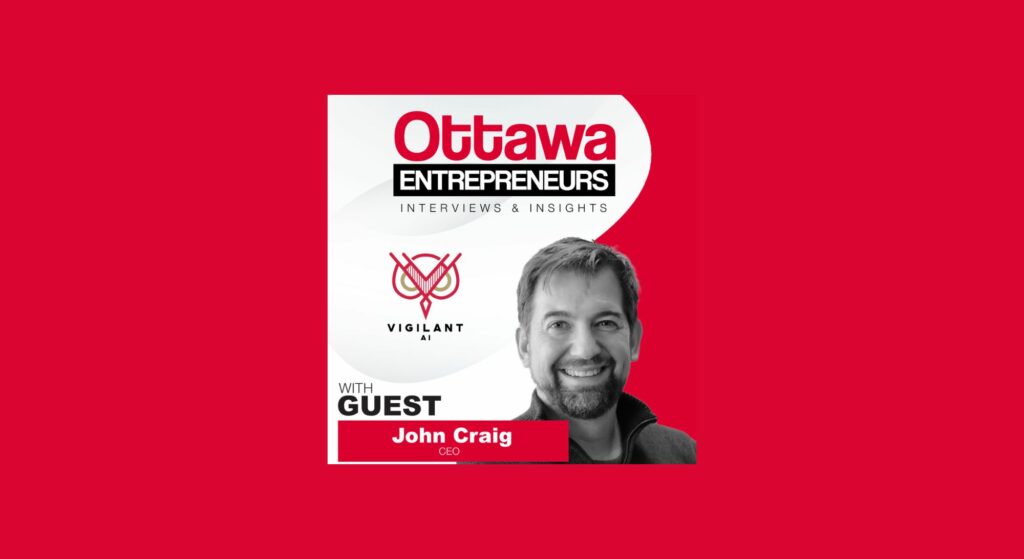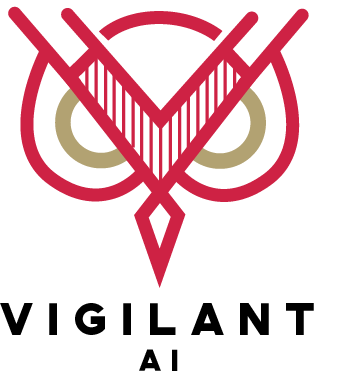Vigilant-AI Ottawa Entrepreneurs Podcast. The Ottawa Entrepreneurs Podcast is hosted by Pat Whalen. John Craig, CEO of Vigilant AI was the guest on a recent episode. What you will read is the transcript of the conversation.
Pat: Thanks, John, for coming on the show today. I really appreciate you taking the time.
John: Thanks, Pat, for having me.
Pat: Why don’t we start off, John, if you could please introduce yourself and your company?
John: I’m John Craig, the Chief Executive Officer of Vigilant AI. Vigilant AI is an intelligent data management company. You may be asking, what’s intelligent data management? Intelligent data management is the concept of linking together both structured and unstructured data and tying them together in a manner that allows you to automate tasks such as an accounting review process in an audit firm. Alternatively, if you’re in the finance office, it could involve automating the reconciliation of your books at the end of the month or similar tasks.
Up to this point, accountants, auditors, and financial analysts have all struggled with linking their spreadsheets, invoices, receipts, master service agreements, and emails between buyers and suppliers into a common repository. This prevents them from analyzing the data effectively or doing anything useful with it. This issue holds up auditors and, in the audit community, has led to an increasing number of audit failures and fines. In finance offices, it’s about not being able to reconcile books quickly enough or make timely recoveries from suppliers who may have overcharged them, which is a particularly significant issue in a high-interest-rate environment.
These are the kinds of use cases we think about and work on with our clients. That’s the basis for Vigilant AI.
Pat: Is it a money saver, a time saver, or both? Does it boost productivity?
John: It’s all of those things. For auditors and accountants, it enables them to process more data. One problem we’ve encountered in the audit and accounting communities is the sheer amount of data. Failures are on the rise because people simply can’t review enough data. Up to now, auditors have relied on something called random sampling. And while that’s enshrined in the rules of how audits are performed, if you can automate the process and look at more data, random sampling becomes less necessary.
With our solution, auditors can confirm data more comprehensively, whether it’s provided by a company during an audit or used internally by a Chief Financial Officer to ensure accuracy. This added assurance is invaluable—it’s about avoiding significant risks, including legal consequences.
Pat: So, is that the sales pitch? “Don’t go to prison, use our product”?
John: Exactly, yes. “We’ll keep you out of prison!”
Pat: How old is the company?
John: We’ve been around since 2021, so we’re just over the three-year mark. I think every entrepreneur’s journey involves overcoming that initial period. Here’s some advice I’d give to any entrepreneur listening: If you think you’re going to succeed within five years, you should plan for a 10-year horizon. Even if your idea seems hot and in demand, it usually takes much longer for the marketplace to accept you.
Pat: That’s an interesting point. A recurring theme on this podcast is how sales cycles have lengthened since the pandemic. Regardless of industry, I keep hearing the same thing—what used to take six months now takes nine, ten, or even twelve months. Is your experience similar?
John: Yes, absolutely.
Pat: What were you doing before you started Vigilant AI?
John: I worked at a local Ottawa company called MindBridge AI, which you may have heard of. They specialize in financial anomaly detection and risk scoring of financial transactions. That was my introduction to the accounting space. My background, prior to that, was in telecom, voice-over IP, and mobile app development. At MindBridge, I realized that my previous experience with network management software and big data translated well to accounting. In telecom, we dealt with large-scale data, managing signals from networks to identify issues like outages or collisions. Similarly, financial transactions involve significant amounts of data, and the data-handling problems are surprisingly familiar. Jumping from telecom to accounting wasn’t as big of an adaptation as it might seem.
Pat: Who is the ideal client for your product? Does a business need to reach a certain size to see the benefits?
John: We’ve geared our product towards the mid-market. That typically includes companies with revenues starting around $50 million and up to just shy of $1 billion. While a billion-dollar company might seem large to some, there are many firms of this size outside the Fortune 2000. These businesses face significant data challenges, especially if they’ve made acquisitions and are running multiple enterprise resource planning (ERP) systems. Managing and integrating data from these systems often falls to inefficient processes, like merging spreadsheets, which is time-consuming and prone to error. We aim to automate the consolidation, analysis, and verification of this data, providing companies with reliable information. Our customers include finance offices and external audit firms, both of which benefit from enhanced data assurance and streamlined processes.
Pat: I assume your customer base is global?
John: It can be. We typically follow a “land and expand” model. We start by selling to American companies because Canadians are slower to adopt new technologies. Americans are often more open to innovation, though there’s still some risk aversion post-pandemic. Interestingly, my best customers, across all the companies I’ve worked with, have always been in Texas and California. These states have a risk-taking culture that fosters partnerships with smaller companies like ours.
Pat: How long have you been an entrepreneur?
John: This is my third true iteration as an entrepreneur. My first attempt was when I was young and inexperienced, and I shut it down quickly. Later, I started a company that developed a way to read attachments on early BlackBerry devices. That was a novel concept at the time. I even appeared on an early version of Dragons’ Den on BNN in the early 2000s. It was a great experience, and while I didn’t secure funding on the show, it opened doors for conversations with venture capitalists.
Pat: What advice would you give to someone running a struggling business?
John: Don’t treat your startup like a baby. You can’t abandon a baby, but you can let go of a startup. It’s important to recognize when you’ve over-invested in something that isn’t hitting the market. Take the experience, learn from it, and fail forward. Many entrepreneurs see failure as a setback, but it’s really just preparation for the next venture. Every attempt equips you with new knowledge and skills.
Pat: Do you think some entrepreneurs are too married to their ideas?
John: Yes, that’s a common issue. Timing is crucial. Many great ideas fail because the market isn’t ready, or they lack the necessary support. For example, Zoom became a household name during the pandemic, but the technology existed long before that. Timing, environment, and perseverance all play a role in whether an idea succeeds.
Pat: What advice would you give to someone thinking of starting a business?
John: I’m a bit of a contrarian here. My advice is to work in the industry you’re interested in before starting your own business. Learn on someone else’s dime. Gain experience in areas like accounts payable, accounts receivable, talent acquisition, and corporate culture. The odds of succeeding without this foundation are slim. Once you’ve built a network and acquired the right skills, you’ll be better positioned to start your own venture.
Pat: That’s great advice. John, before we let you go, where can our listeners learn more about you and Vigilant AI?
John: You can find us at vigilant-ai.com, on LinkedIn, and on X (formerly Twitter).
Pat: Thanks so much for your time today, John.
John: Thank you, Pat. Cheers.
Discover the future of financial auditing: Start your free trial today and let Vigilant AI show you the difference with one month’s worth of your data, no commitment required. Contact us today.



Recent Comments